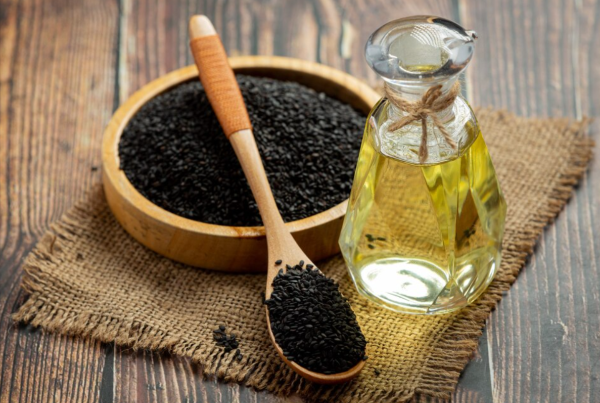Did you know that black seed oil has been used for centuries due to its numerous health benefits? Learning to make black seed oil at home can be rewarding and cost-effective. You can create this potent elixir known for its anti-inflammatory and antioxidant properties by following simple steps and using common kitchen tools.
Understanding Black Seed Oil
Origins and Benefits
Black seed oil, also known as black cumin seed oil, has a rich history dating back to ancient Egypt, where it was used for its medicinal properties. This oil has been a staple in traditional medicine for centuries due to its various health benefits.
Regular consumption of black seed oil is associated with anti-inflammatory and antioxidant properties, making it beneficial for overall health. It is believed to aid in digestive issues, skin conditions, and even respiratory ailments.
Making black seed oil at home offers several advantages. Not only can you ensure the quality and purity of the final product, but it also allows for customization based on individual preferences and needs.
Key Components
The key components found in black cumin seeds, such as thymoquinone, thymohydroquinone, and thymol, are responsible for the oil’s potent health properties. These components work synergistically to provide anti-inflammatory, antibacterial, and immune-boosting effects.
Thymoquinone, the primary active compound in black seed oil, exhibits strong antioxidant properties that help combat oxidative stress in the body. Thymohydroquinone contributes to its anti-cancer potential, while thymol enhances its anti-fungal properties.
The effectiveness of black seed oil heavily relies on these essential components, highlighting the significance of using high-quality seeds and proper extraction methods for optimal health benefits.
Preparing for Extraction
Necessary Equipment
You will need a few essential tools and supplies to make black seed oil at home. Firstly, gather black cumin seeds, a cold-press oil extractor, and a clean glass jar for storage. The cold-press extractor is crucial for extracting oil without compromising its quality.
Prepare a mortar and pestle to crush the seeds before extraction. This step effectively releases the oils. You can source these items from local kitchenware stores or online platforms catering to home oil-making equipment. Beginners can also find starter kits with all the necessary tools in one package.
Selecting Quality Seeds
Selecting high-quality black cumin seeds is paramount for a potent final product when making black seed oil. Opt for seeds that are organic and free from any additives or pesticides. Good seeds should have a strong aroma and be uniform in size, indicating freshness and quality.
For quality seeds, consider reputable vendors specializing in herbs and spices. Online retailers focusing on natural products or health foods often offer premium black cumin seeds suitable for oil extraction. Choosing the best seeds ensures more beneficial compounds in your homemade black seed oil.
Making Black Seed Oil at Home
To make black seed oil, cold-press black cumin seeds to extract the oil, ensuring the process preserves nutrients without heat or chemicals.
Cleaning Seeds
Clean the seeds thoroughly to remove impurities and ensure high-quality black seed oil. Sort through the seeds and discard any debris or foreign particles. Then, rinse the seeds under running water to eliminate dirt and dust. Avoid using wet or damp seeds for oil extraction, as moisture can affect the final product’s quality.
Common mistakes to avoid during the seed cleaning process include not inspecting the seeds carefully, which can lead to impurities in the oil. Inadequate rinsing may result in a contaminated end product. Properly cleaned seeds are vital for obtaining pure, nutrient-rich black seed oil.
Drying Process
After cleaning, it is crucial to dry the black cumin seeds before grinding them for oil extraction. Drying helps remove excess moisture from the seeds, preventing mold growth and ensuring better oil quality. Different drying methods, such as air drying or using a dehydrator, can impact the flavor and potency of the extracted oil.
To ensure proper drying conditions, spread the cleaned seeds in a single layer on a clean cloth or tray in a well-ventilated area. Avoid exposing them to direct sunlight, which can degrade the seed’s nutritional content and affect the oil’s taste.
Cold Press Method
The cold press method is commonly used for extracting black seed oil at home. This technique involves pressing the dried seeds at low temperatures to preserve their nutritional benefits. Cold pressing helps maintain the oil’s natural properties and antioxidants, making it a preferred method for health-conscious individuals.
You can extract pure and unrefined oil rich in essential fatty acids and vitamins A, B, and C by gently crushing and pressing the dried black cumin seeds. A simple step-by-step process ensures you obtain high-quality black seed oil with maximum health benefits.
Filtering Oil
Filtering black seed oil after extraction removes any remaining sediments or impurities. The filtration process helps enhance the clarity and purity of the oil while improving its shelf life. Common filtering techniques include cheesecloth, coffee filters, or specialized filter papers based on personal preferences.
Choosing an appropriate filtering method is crucial for achieving a clean, clear black seed oil suitable for consumption or external use. Select a filtering technique that aligns with your desired level of purity and clarity to enjoy all the beneficial properties of homemade black seed oil.
Advantages of Homemade Oil
Health Benefits
Consuming homemade black seed oil offers numerous health advantages. Regular intake can boost overall well-being by supporting the immune system and aiding digestion. The oil is known to have anti-inflammatory properties, benefiting conditions like asthma and arthritis.
Antioxidant Properties
Homemade black seed oil is rich in antioxidants crucial for maintaining good health. These antioxidants protect cells from damage caused by free radicals, reducing the risk of chronic diseases. Individuals can effectively promote their well-being and combat oxidative stress by consuming the oil.
Purity and Potency
Ensuring the purity and potency of homemade black seed oil is essential for reaping its full benefits. Storage conditions, extraction methods, and seed quality can impact the oil’s purity and potency. To maintain quality for long-term use, store the oil in a cool, dark place and seal it tightly to prevent oxidation.
Using Black Seed Oil
For Hair Care
Black seed oil is a versatile remedy for hair care. It promotes hair growth by nourishing the scalp and strengthening hair follicles. Mix a few drops with your shampoo or apply it directly to the scalp to incorporate it into your routine.
-
Benefits: Improves scalp health, reduces dandruff, and adds shine to hair.
-
Tips: Massage black seed oil onto the scalp before bed and wash it off in the morning for optimal results.
Skin Applications
Black seed oil offers numerous benefits for skin care. Its anti-inflammatory properties help soothe skin conditions like eczema and acne. Applying black seed oil topically can moisturize the skin, reduce redness, and promote healing.
-
Use black seed oil with carrier oil for a hydrating face serum, or add it to your moisturizer.
-
DIY recipe: Create a natural face mask by combining black seed oil with honey and yogurt for glowing skin.
Tips and Precautions
Storage Tips
To maintain the freshness of homemade black seed oil, store it in a cool, dark place away from direct sunlight. Ideal conditions include a temperature range of 60-72°F to prevent rancidity. Suitable containers for storage are dark glass bottles to protect the oil from light exposure.
Dosage Guidelines
The recommended homemade black seed oil dosage is typically one to two teaspoons daily. Factors influencing dosage include age, health condition, and individual tolerance. Consulting a healthcare professional for personalized dosage recommendations is crucial to ensure safe consumption.
Side Effects
Potential side effects of consuming black seed oil may include digestive issues like upset stomach or diarrhea. To mitigate these, start with small doses and gradually increase intake. Precautions include avoiding high doses, especially during pregnancy or breastfeeding. Consultation with a healthcare provider is essential before starting any new supplement regimen.
Beyond Health Benefits
Cosmetic Uses
Black seed oil offers numerous benefits when incorporated into beauty routines. It can enhance skin and hair health, promoting a natural glow.
By using black seed oil in cosmetic products, individuals can experience improved hydration and nourishment for their skin and hair.
DIY recipes for creating natural cosmetics with black seed oil are widely available, allowing people to customize their beauty products based on their preferences.
Culinary Applications
In the culinary world, black seed oil adds a unique touch to various dishes and cuisines. Its distinct flavor profile can enhance the taste of different recipes, adding depth and richness to meals.
Cooking with black seed oil opens possibilities, from drizzling it over salads to incorporating it into marinades or dressings.
With the right cooking tips and recipe ideas, individuals can easily incorporate black seed oil into everyday meals, reaping its nutritional benefits and delicious taste.
Closing Thoughts
You’ve learned how to make black seed oil at home, unlocking its numerous health benefits. By preparing it yourself, you ensure purity and quality, enhancing its effectiveness. Homemade black seed oil can be a versatile addition to your wellness routine, offering natural remedies for various ailments.
Take charge of your health by incorporating homemade black seed oil into your daily regimen. Experiment with different uses and experience the positive impact it can have on your well-being. Start creating your batch today and enjoy this potent oil’s holistic advantages.
Frequently Asked Questions
How long does it take to make black seed oil at home?
Making black seed oil at home takes approximately 2-3 hours, including the preparation and extraction process. The time may vary depending on your chosen method and the number of seeds used.
Can I use roasted black seeds to make the oil?
No, using raw black seeds to make the oil is recommended as roasting can alter the chemical composition and reduce the oil’s effectiveness. Stick to using raw black seeds for optimal results.
How should homemade black seed oil be stored?
Store homemade black seed oil in a cool, dark place away from direct sunlight. Use airtight containers to prevent oxidation and maintain its potency. Proper storage can help extend the shelf life of your homemade oil.
Are there any side effects of using black seed oil?
While black seed oil is generally safe in moderation, some individuals may experience minor side effects, such as digestive issues or skin irritation. Before widespread use, it’s advisable to perform a patch test.
Can pregnant women consume black seed oil?
Pregnant women are advised to consult their healthcare provider before consuming black seed oil due to its potential effects on pregnancy. It’s essential to seek professional medical advice before incorporating any new supplement during pregnancy.

